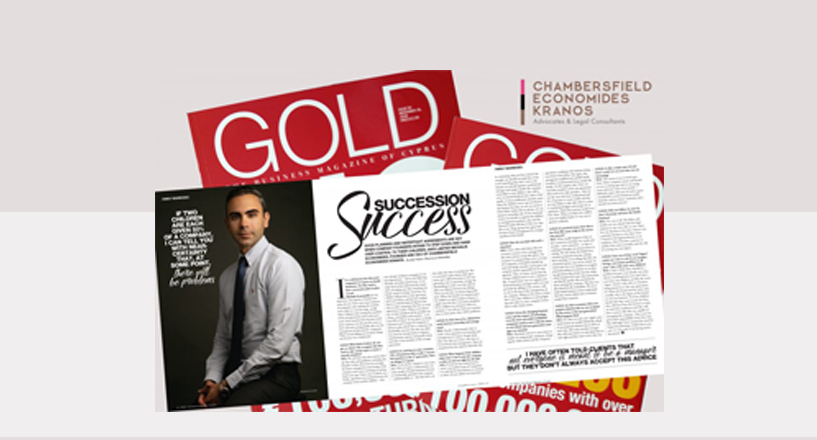Succession Success

Interview of Michalis Economides, Advocate & Legal Consultant | CEO of Chambersfield Economides Kranos Law firm | Gold Magazine November 2018
GOLD: It’s a well-known fact that most companies in Cyprus are family businesses. Do they tend to have a succession plan in place or not?
Michalis Economides: In my experience, the majority of family businesses do not. I have seen many instances of companies only realizing the need for such a plan at a very late stage, usually when a dispute arises among the members of the next generation and it ends up in court. Such situations have become much more common over the past five years, as more and more young people take over the management of their parents’ companies. When several siblings are involved, things can become very complicated.
GOLD: What kind of advice do you give to clients who recognize that they need to take certain steps to ensure a smooth transition?
M.E.: We tell them that they need to draw up clear rules and guidelines, including the founder’s wishes about how he envisages the future management and strategy of the company and to put everything in writing. Some years ago, I had a case in which, on a Friday, agreement was reached between the company owner and his children – who were already working as managers in various departments – and on the following Monday, the father passed away. It was tragic but he had understood the importance of making sure that everything was clearly stated in writing. Years later, his children still go back to that agreement and its provisions, and that has enabled them to avoid the kind of disputes that arise in other companies that have no such agreements in place. When it was drawn up, we had considered all the possible outcomes,eventualities and scenarios – or at least 99% of them. So my advice to family businesses and Groups of Companies is always to plan ahead, have a corporate and shareholder structure that does not allow any room for interpretation or disputes,and determine separate and specific duties and roles to the members of the younger generation.
GOLD: It’s said that in some countries, 70% of businesses fail to make a successful transition to the 2nd generation. How are things in Cyprus?
M.E.: To be honest, I think it’s even more than 70% in Cyprus. Unfortunately, too many people in family businesses become so emotionally attached to the company – understandably so – that they fail to see the reality that time is running out. But it is essential to plan ahead, make agreements, give solid instructions to the next generation and, in particular, arrange the shareholding in such a way that will not allow any disputes between the siblings. This is an area that can lead to huge problems. When the founder of a business gives his children an equal number of shares, it might seem fair but it can lead to deadlock. If two children are each given 50% of a company, I can tell you with near-certainty that, at some point, there will be problems.
GOLD: So there has to be a distinction made between ownership and management?
M.E.: Exactly. Unfortunately, there is rarely a clear separation of ownership and management in Cyprus. People think that, once they are owners, they have to be involved in the management. There are exceptions but the majority think like this.
GOLD: What happens if the children either don’t want to join the company or they are just not right for the job?
M.E.: If someone has worked hard to create a successful Group of Companies, it is only fair for that business to continue to thrive. If your child is not interested in continuing what you have started, fair enough; you should not push him or her to do something they don’t want to do. Instead, you should appoint a professional manager and simply transfer the company ownership to your children, who will receive an annual dividend and a share of the profits. A more problematic situation arises when the children want to get involved in the business but they are not cut out for it. If the father realises this in advance, he can propose ownership only. If, for emotional reasons, he decides to appoint his children to management positions, time and the financial results will show if they are capable or not. Huge groups have gone bust because of poor management by younger members of the family.
GOLD: How do you deal with such a situation?
M.E.: I have often told clients that not everyone is meant to be a manager but they don’t always accept this advice. On occasion I’ve proposed that, if it’s a Group of Companies, it should be divided up and each family member can be given one company and be responsible for its management. That, of course, means that the Group is diluted and it is not a solution I like. A much better one is to appoint professional business managers and to try and persuade the siblings to be owners, with no say in the day-to-day management of the company. Whatever the answer, if they don’t want their children to end up fighting each other in court, company owners have to take timely action.
GOLD: Given the changing business scene and the impact of technology, even the most successful established companies need to move with the times, so new blood and next generation managers are essential.
M.E.: Absolutely and we’ve seen many examples of young people coming in, changing the whole system and the company’s operations, resulting in the business doing even better than before. But again, that presupposes qualified and suitable family members or professionals from outside the family. On the negative side, I have noticed that members of the next generation often tend to be risky spenders – they are not the ones who have worked hard and for a long time to create wealth and they are more likely to take risks when it comes to marketing budgets and mergers & acquisitions, which their parents would never have done. When you find a few million euros of available funds, it’s very easy to spend it recklessly.
GOLD: In practical terms, how does a law firm like yours, help in the succession process?
M.E.: What usually happens is that we have numerous meetings over weeks and months – years sometimes – so that everything is thought out and put down in writing. We also advise the family from a business perspective because, during those meetings, we see things that they, for emotional reasons, may not see clearly. It’s much easier for us as outsiders to recognize potential problems in advance so we draw up agreements that clearly state the wishes of the founder/CEO, give clear instructions and identify specific roles and duties for those entering the company. They key is to plan ahead for all eventualities. We try to make family business owners understand that they need to think more as business people than as parents.
GOLD: Are there occasions when you propose solutions that are not accepted by the owner or the next generation? What happens then?
M.E.: Yes, there are such cases. Again, emotional reasons are usually behind the refusal of our proposed solutions but in 99% of such cases, after some months or longer, they will come back to us and admit that we were right and they want to do it that way.
GOLD: Is this a major part of your firm’s work? Is it an area that you see increasing?
M.E.: The answer is yes to both questions. Many company owners and founders are at retiring age and we are seeing more and more cases every month. I definitely expect this area of work to grow considerably as more businesses understand the need to ensure continuity and a smooth succession process.
GOLD: Did you follow in your father’s footsteps and join the family business?
M.E.: No, not at all. My father and mother are not related with the legal industry in any way what so ever, therefore my decision to become a lawyer was a genuine decision to do what I love. I started in the legal profession as an employee, then I became a partner in another firm and eventually took the risk of creating my own legacy.
GOLD: Your use of that word ‘legacy’ makes me want to ask if you imagine facing a succession problem in 20years’ time with your own children!
M.E.: I don’t think there should be a problem because I am already very clear about everything from now and I don’t even have any children yet! But the word ‘legacy’ doesn’t only refer to a business being passed on to the next generation. It’s about the brand and the name and, actually, this is the legacy of the founders of every business. So if my children decide that they want to join the firm, they will start from the bottom as trainees and then employees and they will have to prove that they are capable of managing the company. They won’t be given that responsibility from Day One. But although I have stressed the need for long-term planning, I think that in my case, it’s very early to be having such a discussion!

